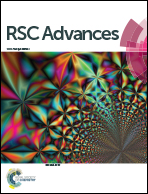Polystyrene resin supported palladium(0) (Pd@PR) nanocomposite mediated regioselective synthesis of 4-aryl-1-alkyl/(2-haloalkyl)-1H-1,2,3-triazoles and their N-vinyl triazole derivatives from terminal alkynes†‡
Abstract
An efficient general methodology has been developed for sequential one-pot synthesis of 4-aryl-1-alkyl-1H-1,2,3-triazoles influenced by polystyrene resin supported palladium(0) (Pd@PR) nanocomposite as a heterogeneous catalyst. The present work particularly emphasizes the synthesis of 4-aryl-1-(2-haloalkyl)-1H-1,2,3-triazoles through the selective mono-azidation of 1,2-dihaloethane and subsequent Pd@PR mediated 1,3-dipolar cycloaddition with terminal aryl alkynes. Potassium carbonate promoted dehydrohalogenation of synthesized 4-aryl-1-(2-haloalkyl)-1H-1,2,3-triazoles gave the corresponding N-vinyl derivatives (often used as building blocks for polymers) which are further utilized in the synthesis of 4-aryl-1-(2-arylalkenyl)-1H-1,2,3-triazoles following a Pd@PR catalyzed Heck coupling approach. Furthermore, microwave assisted one pot dehydrochlorination and Heck strategy was adopted to afford 4-phenyl-1-styryl-1H-1,2,3-triazole under Pd@PR catalyzed conditions using iodobenzene as a phenylating agent.


 Please wait while we load your content...
Please wait while we load your content...